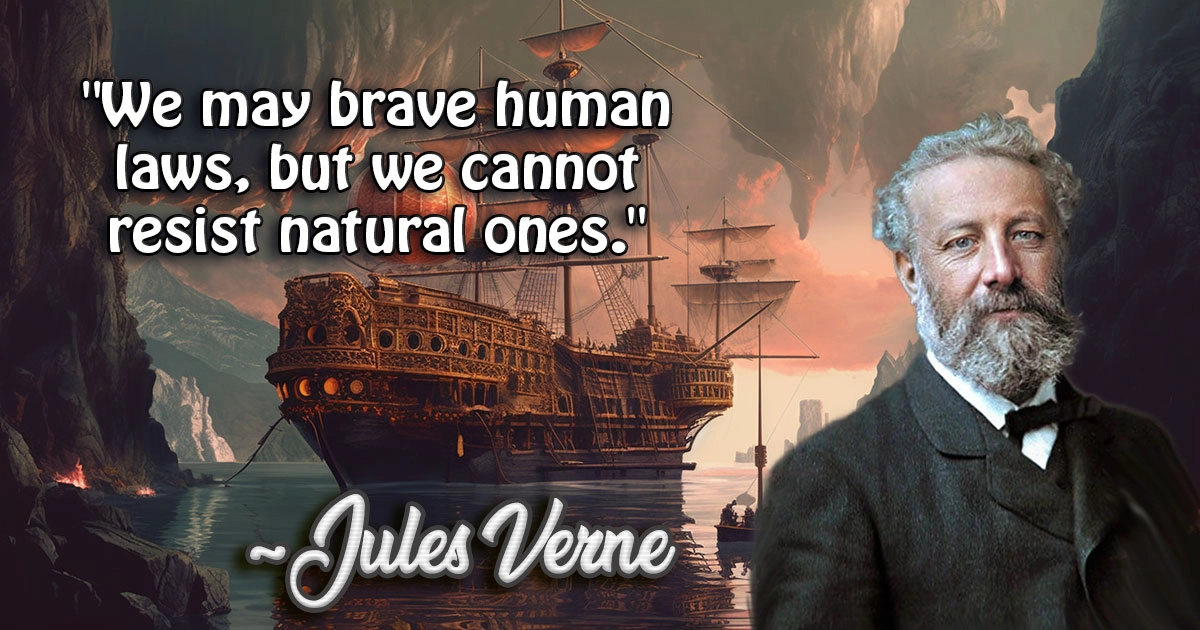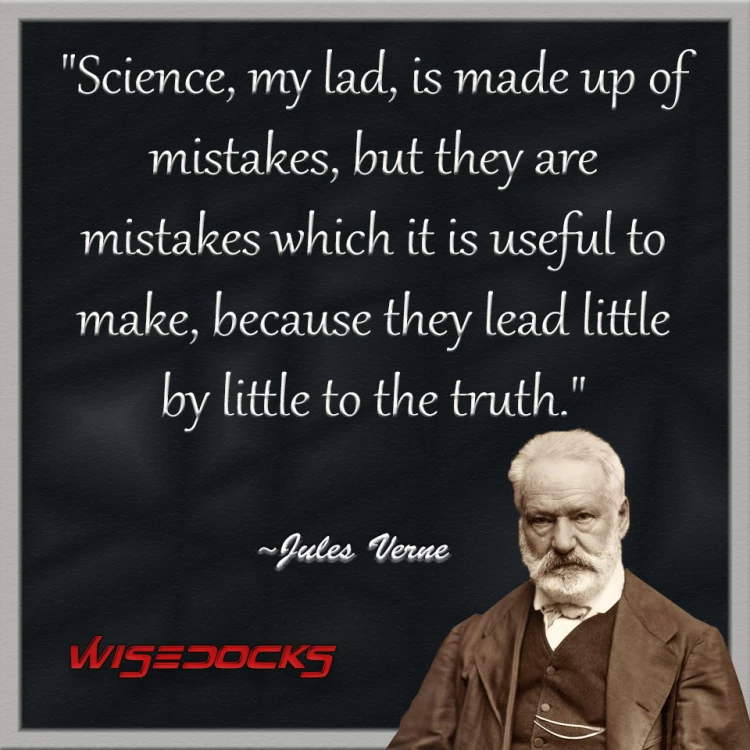Jules Verne: The Visionary Father of Science Fiction

Jules Verne
Jules Verne was born on February 8, 1828, in the bustling port city of Nantes, France. The eldest of five children, Verne was born into a family that valued literature and adventure. His father, Pierre Verne, was a lawyer, and his mother, Sophie Allote de la Fuye, came from a line of navigators and shipowners. This blend of intellectual rigor and maritime tradition profoundly influenced young Jules, sparking a lifelong fascination with exploration and the unknown.

From an early age, Verne was an avid reader, devouring books on science, history, and travel. The tales of Robinson Crusoe and the adventures of Alexander Selkirk fueled his imagination, planting the seeds for his future literary endeavors. At the age of 11, Verne famously attempted to run away to sea, planning to stow away on a ship bound for the Indies. Although his father thwarted this plan, the incident foreshadowed the themes of adventure and exploration that would later define his works.
Early Career and Literary Beginnings
In 1847, Verne moved to Paris to study law, as his father intended him to follow in his legal footsteps. However, the vibrant literary scene of the French capital soon captured his heart. He befriended writers such as Alexandre Dumas and Victor Hugo, who encouraged his literary aspirations. Verne began writing plays, short stories, and librettos, though he found limited success initially.

His fortunes changed when he met publisher Pierre-Jules Hetzel in 1862. Hetzel recognized Verne's unique talent and encouraged him to focus on adventure novels that incorporated scientific and geographical elements. This partnership proved to be a turning point in Verne's career, leading to the publication of his first major success, "Five Weeks in a Balloon," in 1863. This novel, which combined thrilling adventure with detailed scientific explanations, set the template for Verne's future works.
The Extraordinary Voyages
Verne's "Extraordinary Voyages" series, a collection of 54 novels written between 1863 and 1905, cemented his reputation as the father of science fiction. These novels took readers on incredible journeys to the farthest reaches of the Earth, beneath the seas, into the skies, and even to the moon.
Journey to the Center of the Earth: Published in 1864, this novel follows the adventures of Professor Lidenbrock, his nephew Axel, and their guide, Hans, as they embark on a perilous expedition to the Earth's core. The story's blend of scientific curiosity and fantastical elements captivated readers, showcasing Verne's ability to make the impossible seem plausible.

Twenty Thousand Leagues Under the Sea: In 1870, Verne introduced readers to Captain Nemo and his submarine, the Nautilus. This novel not only thrilled readers with its underwater adventures but also demonstrated Verne's foresight in envisioning advanced technology. The Nautilus, with its electric power and sophisticated design, was a marvel of imagination that predated the actual invention of submarines by decades.
Around the World in Eighty Days: Published in 1873, this novel tells the story of Phileas Fogg and his valet, Passepartout, as they race against time to circumnavigate the globe. The book's fast-paced narrative, colorful characters, and exotic locales made it an instant hit, solidifying Verne's status as a master storyteller.
Scientific Foresight and Technological Predictions
One of the most remarkable aspects of Verne's work is his uncanny ability to predict future technological advancements. His novels are filled with inventions and ideas that were far ahead of their time, earning him the moniker of "the man who invented the future."

Submarines and Deep-Sea Exploration: In "Twenty Thousand Leagues Under the Sea," Verne envisioned a submarine that could travel great distances underwater, complete with air conditioning, diving suits, and powerful spotlights. This concept foreshadowed the development of modern submarines and deep-sea exploration technology.
Space Travel: In "From the Earth to the Moon," published in 1865, Verne described a mission to the moon using a spacecraft launched from a giant cannon. While the specifics of his method were scientifically implausible, the novel anticipated many aspects of space travel, including the challenges of weightlessness and the need for a controlled environment. Verne's vision of lunar exploration was remarkably prescient, considering it was written more than a century before the Apollo moon landings.
Air Travel: Verne's "Robur the Conqueror" (1886) and its sequel, "Master of the World" (1904), featured advanced flying machines that resembled modern helicopters and airplanes. These stories reflected Verne's fascination with the possibilities of flight long before the Wright brothers achieved their first successful powered flight.
Personal Life and Challenges
Despite his literary success, Verne's personal life was not without its challenges. He married Honorine de Viane Morel in 1857, and the couple had one son, Michel. However, their relationship was often strained, and Verne's demanding writing schedule left little time for family life.

In 1886, Verne experienced a traumatic incident when his nephew, Gaston, shot him in the leg. The injury left Verne with a permanent limp and contributed to a more reclusive lifestyle in his later years. Despite these hardships, Verne continued to write prolifically, producing some of his most enduring works during this period.
Legacy and Influence
Jules Verne's impact on literature and popular culture is immeasurable. His visionary ideas and thrilling adventures have inspired countless readers, writers, and scientists. Verne's works have been translated into more than 140 languages, making him one of the most translated authors in history.
Influence on Science Fiction: Verne's pioneering blend of adventure and scientific speculation laid the groundwork for the science fiction genre. Authors such as H.G. Wells, Arthur C. Clarke, and Isaac Asimov have cited Verne as a major influence on their work. His emphasis on plausibility and detailed scientific explanations set a standard for the genre that continues to this day.
Adaptations and Homages: Verne's novels have been adapted into numerous films, television series, and stage productions. Classic films such as "Journey to the Center of the Earth" (1959), "Around the World in Eighty Days" (1956), and Disney's "Twenty Thousand Leagues Under the Sea" (1954) have brought his stories to new audiences and cemented his status as a cultural icon.
Legacy in Science and Exploration: Verne's imaginative vision has also inspired real-world explorers and scientists. The American astronaut James Lovell, commander of the Apollo 13 mission, named Verne's "From the Earth to the Moon" as one of the books that inspired his career in space exploration. Additionally, the underwater explorer Jacques Cousteau credited Verne's novels with sparking his interest in the ocean.
The Final Years
Jules Verne continued to write and publish novels until his death on March 24, 1905. His later works, such as "The Mysterious Island" and "The Invasion of the Sea," continued to explore themes of adventure, discovery, and the relationship between humanity and the natural world.
Verne's influence extended beyond his lifetime, with many of his unpublished manuscripts and notes being discovered and published posthumously. These works further showcased his incredible foresight and boundless imagination.
His Legacy Lives On
Jules Verne's legacy as the father of science fiction and a visionary storyteller remains as strong today as it was over a century ago. His extraordinary voyages continue to captivate readers with their blend of scientific curiosity, adventure, and imagination. Verne's ability to envision future technological advancements and his unwavering belief in the power of exploration have left an indelible mark on literature and popular culture.
As we look to the future, Verne's works remind us of the importance of dreaming big and pushing the boundaries of what is possible. His stories continue to inspire new generations of readers, scientists, and adventurers, ensuring that the imaginative journey of Jules Verne will never truly come to an end.


